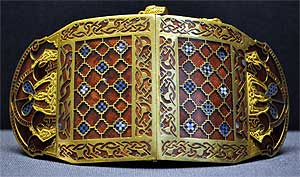 You can’t have a character without a name. Yet, sometimes, creating the name is the hardest thing about making a character. “Beyond ‘Fred'” is a series that lists names from history and other cultures to help you find that perfect character name.
You can’t have a character without a name. Yet, sometimes, creating the name is the hardest thing about making a character. “Beyond ‘Fred'” is a series that lists names from history and other cultures to help you find that perfect character name.
This time, we’re covering Anglo-Saxon names again, they’re just that cool. I’m doing something I haven’t done before in this series, and that’s giving some pronunciation guides, along with the name’s meaning. That’s because Anglo-Saxon names have meanings that are so perfect for fantasy games. My pronunciations may not be exactly perfect, but they’ll work for fantasy games.
Because of that, I’ve repeated some of my favorite names from the first Anglo-Saxon names post, so that you have an idea of how to pronounce them. Of course, if it’s fantasy, you can pronounce these any way you want to 😉 .
As always, I am more concerned with “flavor” than historical accuracy. So, without further ado….
Male Names
Æðelbald (A-thel-bald): nobly bright
Ælfhere (Alf-he-re. These are short “e”s, as in “red”): elf warrior
Ælfred (Alf-red): elf counsel
Ælfwine (Alf-win-e): elf friend
Æthelwulf (A-thel-wülf): noble wolf
Arlys (AR-loos): honorable
Baldric (Bald-ric): bold power
Banan (BAN-an): slayer
Baylor (BAA-oo-lore): horse trainer
Beorhtraed (BE-ore-tread. Short “e”, like “bed”): bright counsel
Betlic (BET-lick): Splendid
Boden (BO-den. With a short “o”, like “pot”): messenger
Cædmon (CAD-mon. With a short “o”, like “pot”): poet
Cæna (CHAIN-a): brave, fierce, keen, warlike
Canute (KA-noot-e): knot
Cedric (CHED-rick): renown leader
Dægal (DA-gall): dweller by the dark stream
Deogol (DE-o-gol): secret
Deorwine (DE-or-win-e): dear friend
Drefan (DRE-van): trouble
Eadmar (E-ad-mar): happy and illustrious
Earh (E-are): coward
Edwyn (ED-woon): valued
Faran (FAR-ann): advances
Firman (FIR-man): traveler
Frithuric (FRI-thu-rick): peace ruler
Fyren (FOO-ren): wicked
Galan (Gaa-laan): sing
Gar (GAAR): spear
Gifre (GIF-re. Short “i”, like “gift”): greedy
Gim (GIM. Short “i”, like “gift”): gem
Godwine (GOD-win-e): God’s friend
Grindan (GRIN-dan): sharp
Halwende (HALL-wen-de): lonely
Hengist (HEN-yist): stallion
Ida (ID-a): rich
Irwyn (IRR-woon): sea lover
Kenric (KEN-rick): fearless leader
Landry (LAN-dree): ruler
Leodgar (LE-odd-gar): people’s spear
Lufian (LUV-ee-an): love
Magan (MA-gan): competent
Merwyn (MER-woon): good friend
Nyle (NOO-le): desire
Osbeorn (OS-beh-arn): divine bear
Rædan (RAW-dan): advisor
Raynar (RA-oo-nar): warrior of judgement
Raulf (RA-ulf): house wolf
Rowe (Rah-we): red-haired
Sar (SAR): pain
Scead (SKE-ad): shade
Scur (SKOOR): storm
Seleferth (SELL-e-ferrth): hall life
Selwyn (SEL-woon): fitting friend
Sherard (SER-ard): glorious valor. I’m guessing this is actually “Serard”, since I’ve never seen an “sh” sound in true Anglo-Saxon. It’s usually a modern interpretation
Sigefried (SIG-e-fri-ed): conquering peace
Temman (TEM-man): tame
Þunor (THOO-nar): thunder
Thurgis (THOOR-yis): Thor’s hostage
Wassa (WAS-sa): satyr(?)–uncertain about the exact meaning of this
Wilfrith (WIL-frith): resolute peace (my actual guess would be “stern friend”)
Winfrith (WIN-frith): friend of peace
Wulfric (WÜL-frick): wolf ruler
Female Names
Æðelþryð (A-thel-throoth): noble threatener
Ælfgifu (ALF-gi-voo): elf gift
Ælflæd (ALF-lad): elf beauty
Æryn (AR-oon): elf-like
Ardith (AR-dith): good war
Bemia (BEH-mih-a): battle maiden
Bysen (BOO-sen): unique
Cate (KA-te): innocent
Cendra (KEN-dra): knowledgeable, understands
Cwen (KE-wen): queen
Cyneburga (KOO-ne-burr-ga): pledge of kindred
Darel (DAR-el): little beloved
Eadhild (E-ad-hild. The first “e” is a short e): rich battle maid
Eadlin (E-ad-lin): princess
Edita (E-dit-a): joyful
Eldrita (ELD-rit-a): prudent advisor
Erna (ER-na): reserved, shy
Faina (FA-in-a): joyful
Frithuswith (FRI-thoos-with. Both “i”s are short): peace strength
Gisa (GI-sa): hostage
Hreða (HRE-tha. The “hr” is an unvoiced r. Say ‘H’, then ‘r’ very quickly): an Anglo-Saxon goddess
Hrothwyn (HROTH-woon. The “hr” is an unvoiced r. Say ‘H’, then ‘r’ very quickly): famous joy
Leola (LE-ola. The “o” is short, like in “pot”): deer, swift (as a deer)
Maéda (Ma-ee-da): maiden
Mildryth (MILLED-rooth): mild pledge
Muriel (Muh-ri-el): myrrh, perfumed
Ora (AH-rah): money
Orfa (AH-fah): courageous
Rowena (RAW-en-a): white skirt
Synne (SOON-ne): gift of the sun
Wilona (WILL-ahn-a): hoped for
Ymma (OOM-ma): work
[Image courtesy of micronova via Flickr Creative Commons]
Sources
- Anglo-Saxon Baby Names & Anglo-Saxon Names
- Female Anglo-Saxon Names
- Guide to Pronouncing Anglo-Saxon, A
- Male Anglo-Saxon Names
- Regia Anglorum: Authentic Names





